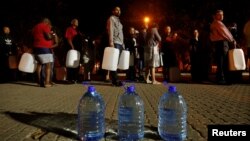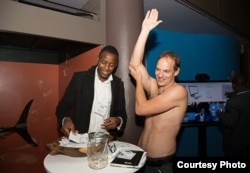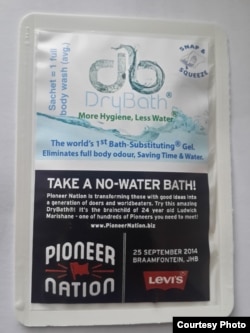In Cape Town, South Africa, the countdown continues to Day Zero, presently scheduled for May 11, when city officials will turn off the water supply to most homes in the metropolis of four million people.
When the day comes, residents will have to line up for severely rationed water, under the watch of security forces.
The Cape region is suffering one of its worst-ever droughts, with reservoirs at record low levels. The crisis means people are adopting new measures to save water.
Elsa Finca opens a sachet to reveal what looks like a white pill. She drips four teaspoons of water onto it. It puffs up into a gel-soaked cotton wipe. Finca uses the wipe to clean her arms.
“Oh, it feels too slimy, and just like a normal gel,” she says, laughing.
The gel is also available in plastic bottles. Finca tries one out, squeezing it over her hands.
Ludwick Marishane is the inventor of the DryBath. He says 15 milliliters of gel is enough to wash one’s entire body. His formula contains natural oils and a transparent salt crystal called tawas.
“It’s a crystal rock from Asia. You wash yourself with water and typically you use this crystal rock as your soap. Over 80 percent of the product is water; we’ve got moisturizers in there. It’s safe; it’s dermatologically tested for use on sensitive skin, and it can even be used on genital areas without any adverse effects,” he said.
Marishane got the idea for DryBath in 2007 at the age of 17, at high school in a rural village in South Africa’s Limpopo province. Like other inhabitants, he had to endure long lines for water at a communal tap.
“A friend of mine had mentioned that he would have liked for somebody to invent something that could clean someone’s body without the need for water. And the reason for that was because we were using the bucket bath method of staying clean. So, Cape Town might be experiencing a drought now and everybody has to use the bucket bath; 60 percent of the world lives like that every day.”
Finca’s family was once part of this statistic.
“We grew up collecting water from the river. We collected only water we could drink. But when we needed to do washing [of our bodies], we would go to the river and do washing there.”
A ‘savior’ solution
But many Capetonians don’t have Finca’s life experience of struggling for water.
So, says Marishane, it has taken them years to accept the DryBath as a substitute. He says this is because most people are convinced that bathing and showering are the only ways to maintain cleanliness.
“But with the drought it’s forcing them to say, ‘Whether I like it or not, a solution like this is actually a savior for me because it would literally cut my water hygiene needs in half for the month.’ So like one DryBath bottle can substitute 15 washes, which is basically half a month of cleaning up.”
Marishane says the product can be used for six consecutive days, after which the user can wash with water to clear oil buildup on the skin.
At the moment, DryBath costs about $1.60 per wash, or sachet, but Marishane is trying to reduce this to about 40 cents per unit to make it cheaper for more people to save more water.
“For the average modern household, we’re saving between 80 to 150 liters each time somebody skips a shower or a bath,” he said.
As Cape Town edges towards Day Zero, an advantage like this means the ‘Sold Out’ sign is now up on the DryBath website.
“In the past week we’ve sold ten times more than what we typically sell in a month. We already put in an order for about a hundred thousand washes that should be getting delivered next week, and then we’ve got more orders coming in to fulfill,” Marishane said.
But it’s not only the Cape drought that’s spurring Marishane on to grow his business.
As temperatures around the world soar, so too do DryBath’s international sales.
“California’s been in a drought for the past four years, so that’s one of the markets where we’ve got a high demand for the product. Japan experienced one as well, last year. India’s going through a very severe one at the moment,” he said.
Marishane’s rags to riches story and his charisma mean he’s now a popular motivational speaker.
“Google named me as one of the [12] brightest young minds in the world [in 2011]. I was the best student entrepreneur in the world [at the Global Student Entrepreneur Awards 2011]; the first African to get that accolade. And one thing that really puzzles me is: I did all of this just because I didn’t want to bathe.”
Marishane enjoys his success. But he maintains he’d much rather sell DryBath to people who “naturally” conserve water, than to those compelled to do so by a disastrous drought.






